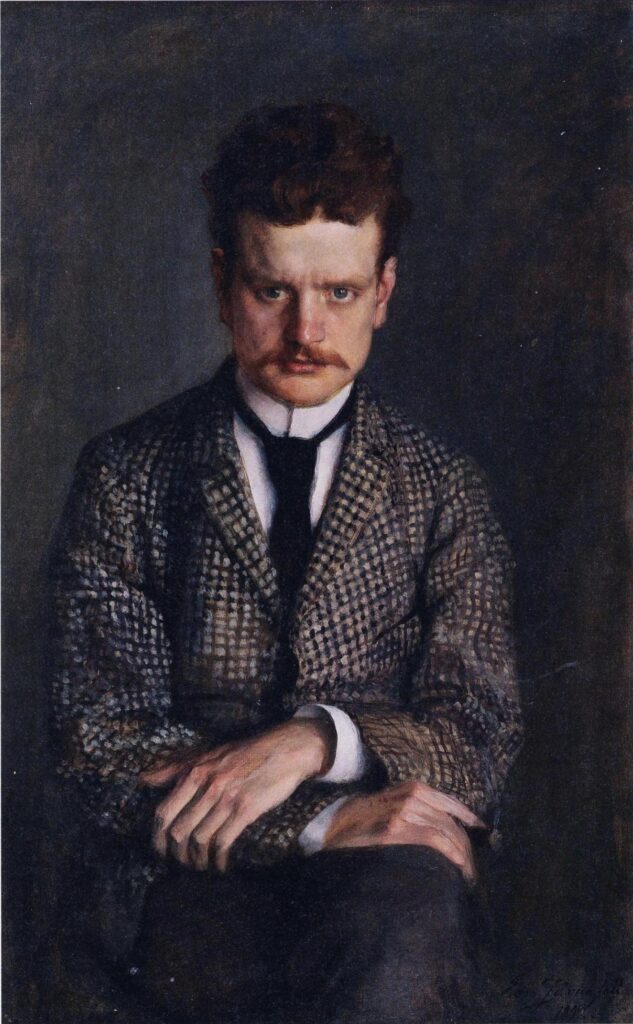ENDNOTES, October 2021
In this edition – Legends from the Bohemian Forest; Symphony No. 3, by Sibelius, reviewed by Stuart Millson; Alchymia by Thomas Adès, reviewed by Leslie Jones

Eero Järnefelt, Iltausva Kolilla, Wikimedia Commons
Dvorak was one of the 19th-century’s greatest masters of melody: his Cello Concerto, Slavonic Dances and Seventh and Ninth Symphonies standing as timeless testaments to the romantic tradition in music. Everything that the composer turned his hand to produced that same natural flow of feeling – as if the music had just drifted from the fields, villages and folk-festivals of Bohemia.
A perfect example of Dvorak’s genius has recently arrived from the Melism label, a recording for piano duet of the Op. 59 Legends and the Op. 68, From the Bohemian Forest. The pianists Anna Zassimova and Christophe Sirodeau conjure a magical mood of fairytale innocence; delighting in the composer’s simple scene-painting and love of local airs and memories from the countryside and hills. The sense of rural atmosphere – contemplation, wandering, the beauty of the seasons, love of the open air – is truly infectious.
The booklet which accompanies the disc contains an interesting insight into Anna Zassimova, who is a talented landscape artist in her own right – and there must be, in her playing of Dvorak, an instinctive sympathy and understanding for this most scenic music. The sequence on disc begins with In The Spinning Room (Op. 68, B.33, No. 1) – an effortless, gentle evocation of the folk-past, highly reminiscent of Dvorak’s tone poems. There is also the more sinister portrayal of Walpurgis Night, but the tension and air clears for Silent Woods. Anna Zassimova’s fellow pianist here is Christophe Sirodeau – an artist trained at the Tchaikovsky Conservatoire in Moscow, a great campaigner for neglected repertoire, and one who has achieved great acclaim from many prestigious artistic bodies, including the French equivalent of Radio 3, France-Culture radio
The quality of the recording deserves much praise: the piano never seems “heavy”, with the recording taking place in a venue (the Eglise Evangelique, Saint-Marcel, Paris) which allows for the music to breathe and disperse, instead of a conventional recording studio in which the sound might be more constricted and “forensic”.

Jean Sibelius, by Eero Järnefelt 1892, credit Wikipedia
The sense of earth, air, rain and legends comes to the fore again, in a recent recording on Rubicon of Sibelius’s Third Symphony, which dates from 1907. The work is performed (along with the Symphony No. 1) by the Royal Philharmonic Orchestra conducted by Owain Arwel Hughes; and the disc marks the beginning of what promises to be an engrossing, romantically-authentic cycle of the composer’s symphonies. Recorded in the splendid acoustic of St. John’s Smith Square, a space which allows for both a degree of reverberation and the capturing of much orchestral detail, the Third Symphony – infrequently performed in our times – emerges as a revelation: a bard-like, considered symphonic story – never overblown, but always noble, even remote – crowned by what must be one of Sibelius’s most hushed slow movements.
Under Owain Arwel Hughes’s direction a certain orchestral weight comes through, even in the passages of diminished sound and activity, but rather than detracting from the intimacy, the interpretation offers a richness of sound not often found in recordings of this work. With all the introspection of his music for The Tempest, and all the softness of the Valse Triste, the Third holds us in a hypnotic state. In the mind’s eye (or ear) one senses that the composer had in mind an evening scene, with clouds slowly moving across the Finnish skies, then disappearing.
A thorough recommendation to anyone who yearns for the very best in orchestral sound – a recording giving us a rich flavour which seems to have disappeared these days, in favour of a more astringent, “colder” style of playing. Arwel Hughes’s lifelong dedication to Sibelius can be fully appreciated here, and one cannot wait for the next parts of the cycle.
Stuart Millson is the Classical Music Editor of The Quarterly Review
CD details: Dvorak, Legends from the Bohemian Forest, Melism label, MLS-CD-027.
Sibelius, Symphonies 1 & 3, Royal Philharmonic Orchestra, Owain Arwel Hughes, Rubicon, RCD 1055.
________________________________________________________
Mark Simpson and Quatuor Diotima in concert, Kings Place, 30 September 2021, reviewed by Leslie Jones
Alchymia, by the composer, conductor and pianist Thomas Adès, was commissioned by King’s Place and is dedicated to the clarinettist Mark Simpson, who gave a bravura performance of this technically demanding piece. As Geoff Brown noted in The Times, Alchymia is a metaphor for “turning simple musical material into gold”. Of the four movements, only the first, A Sea-Change (…those are pearls…) does not reference pre-existing music. Introspective, lyrical, playful and transcendental passages are interspersed therein.
Juxtaposing classical repertoire with modern material (in this instance, with Schubert’s String Quartet no 6 and Brahms Clarinet Quintet) can be problematic. Judging from their body language, the Quatuor Diotima seemed somewhat detached during the performance of the Schubert Quartet, completed when the composer was only sixteen. But they evidently relished performing Adès new work, which received an enthusiastic reception from the audience.
Adès is considered by some commentators as a “titan”, as one of “the true creative thinkers, who mould the cultural landscape” (Fiona Maddocks, the Observer, 23 February 2020). This was therefore something of a coup for King’s Place. The latter’s hospitality and attention to detail were outstanding. We even received a copy of the score.
Dr Leslie Jones is the Editor of QR










